- Home
- Keith Douglass
Nucflash sts-3 Page 2
Nucflash sts-3 Read online
Page 2
“We were particularly interested in your cataloguing system,” Murdock said. “I was told you have a whole warehouse full of Stasi records.”
“More than one, in fact. We Germans, as I’m sure you’ve heard, can be meticulous record keepers.”
“I sometimes think record keeping will be our undoing,” a new voice said at their backs.
Turning, Murdock saw a young, athletic-looking man wearing neatly pressed combat fatigues. A sharpshooter’s badge was pinned to the left breast of his tunic, along with several medals that Murdock did not recognize.
“Oberleutnant Werner Hopke,” the man said said, extending a hand. “Grenzschutzgruppe Nine. You must be the American SEALs, though you seem to be out of uniform. I was expecting swim fins and wet suits.”
The GSG9 was German’s unique answer to the terrorism that had plagued West Germany in the seventies and eighties. The face of terrorism had changed, of course, along with the changing map of Europe during the past few years, but the GSG9 had maintained its status as one of the world’s elite counterterror and hostage-rescue units.
Murdock took the man’s hand. Hopke had a dry, firm grip. “Lieutenant Blake Murdock, United States Navy. And this is my partner in crime, Master Chief MacKenzie. As for the uniform, well, consider this camouflage dress for urban environments.”
Hopke chuckled. “GSG9 is forced to use protective coloration as well, Herr Lieutenant. My condolences. In any case, I am very pleased to meet you both. I have been assigned as your liaison with the Grenzschutzgruppe during your visit. Has our Inge been taking good care of you?”
“Our Inge?” MacKenzie asked. He turned to the woman. “You didn’t say you were with the GSG9.”
She laughed. “I’m not.”
“Miss Schmidt works closely with the Grenzschutzgruppe, however,” Hopke said. “She is, ah, I suppose a computer technician might say she is our primary interface with Komissar. Sometimes I think she is Komissar, which is why mere mortals like us don’t have a chance to get to know her better.”
“Possibly,” Inge told him, with a flirtatious lift of her chin, “you simply haven’t found the proper program to run on me.”
“Ah, tell me about the Euro-terror groups,” Murdock said brusquely. He could sense the chemistry flowing between Schmidt and Hopke, and thought it best to get the conversation back onto strictly professional grounds.
“What did you need to know?” Hopke asked.
Murdock exchanged glances with the other SEAL, then looked Hopke in the eye. “What is your clearance, Herr Leutnant?”
“Blue three.”
“Miss Schmidt?”
“Blue four.”
“Maverick Lance,” Murdock said.
Hopke’s face immediately tightened. “Perhaps,” he said slowly, “this should be discussed in a secure area.”
Murdock nodded. “I couldn’t agree more.”
“Come with me.”
Turning, the four of them left the BKA basement room and the glassed-in Wiesbaden computer. There were some secrets that even Komissar was not yet privy to.
2
Friday, April 27
1110 hours
BKA Headquarters
Wiesbaden, Federal Republic of Germany
The secure room in the BKA headquarters basement had many of the qualities of a bank vault. There was only one way in, past an armed guard and through a massive steel door that gave a muffled, pressurizing hiss when it closed and sealed shut behind them. Inside, it resembled a corporate conference room more than a vault. The soundproofing had been concealed behind rich, wood paneling, the floor was thickly carpeted, and a long table occupied the center of the room, which appeared to have been designed around it. A niche in one corner partly hid a coffee machine and a small refrigerator.
“All the comforts,” MacKenzie said, pouring himself a cup of coffee. “You could live down here for days.”
“There are a number of rooms such as this one in the complex,” Inge told them. “It was thought back in the eighties that, should the Soviets invade, the BKA planning and command staffs could continue their work in secure conditions, despite Spetsnaz commando raids, despite even a nuclear strike on Wiesbaden.”
“And speaking of nuclear strikes,” Hopke said, taking a seat at the conference table, “what is this about Maverick Lance? I saw no report.”
“There hasn’t been one,” Murdock explained. “Not yet. But both the CIA and Navy Intelligence have been following a series of events, incidents if you will, here in Europe. The possibility of a Maverick Lance is very real.”
“I thought your Army’s Delta Force was tasked with such operations.”
Murdock smiled. “You know the American military, Lieutenant. If one of the services is going to do something, they all have to have a piece of it.”
“I’ve often wondered how Americans are able to get anything done,” Hopke said, returning the smile to soften the words. “Their love of bureaucracy rivals that of the Russians.”
“Or the Germans,” MacKenzie said. “Who was it who invented the general staff?”
Hopke’s grin broadened. “Ah, but that was good bureaucracy, you see,” he said, bantering. “The German general staff brought the art of warfare to new heights of organization and efficiency.”
“I see. Is that why Germany lost two world wars in a row?”
“Mac…” Murdock warned.
But Hopke only laughed. “Point taken, Master Chief. Still, this does not sound like an operation that would be of much interest to Navy SEALs. You operate in the water normally, from submarines. Ja?”
“SEALs is an acronym for sea, air, and land, Lieutenant,” Murdock said. “We work wherever they send us, and if that means the nearest water is in our canteen… or in that coffeemaker over there, well, that’s good enough for us.
“Seriously, though, the SEALs have been training against the possibility… no, the probability… of the use of a nuclear device in a terrorist attack for a long time now.”
“Probability?” Hopke said, surprised.
“Look, back at the end of the 1980s, five nations acknowledged having nuclear weapons. Two more, Israel and South Africa, either had nuclear weapons or were thought to have all of the components, requiring only a simple assembly process to to have them ready to arm.
“Then the Soviet Empire collapsed, and any real hope of maintaining the fiction of non-proliferation was smashed forever. Where one nation — the Soviet Union — had maintained an arsenal of something like thirty thousand nuclear warheads, now there are fifteen nations, with more on the way if Russia’s internal problems continue. Most didn’t have any nukes based on their territory, or if they did, the warheads and arming codes were under firm Russian control. Other states, like Kazakhstan, inherited part of the arsenal but pledged to renounce nuclear weapons. But there were still others, like Ukraine, that felt they needed to keep the nukes based on their territory to maintain their newfound independence, just in case the Russian bear gets hungry again.”
“Hell,” MacKenzie said, “even if one of the new governments promises to disassemble all of the weapons it controlled, how could such a promise possibly be monitored?”
“Even more dangerous, though,” Murdock continued, “you have an awful lot of very desperate people running around in a state that has collapsed to near anarchy in some areas. Much of the modern Russian economy — and that means a lot of the government — is controlled by the Russian mafia. It’s an open secret that half a million hard-currency dollars will buy you a small nuke on the weapons black market. And there are generals and scientists and technicians, all of them with access to nukes and all of them knowing that pretty soon they’re not going to have a job. The temptation to sell a few weapons here and there, maybe to some guy from Iran or Libya, must be overwhelming in cases like that.
“Anyway, one of the major nightmares of the people back in the Pentagon whose job it is to think about such things is the one about how easy it will
be to slip a small nuclear device into a major U.S. port aboard a freighter, an oil tanker, even a pleasure boat. It wouldn’t even have to be an atomic bomb. A few pounds of plutonium, stolen from a breeder reactor facility somewhere, or purchased from North Korea and scattered on the winds or the waves by a charge of conventional high explosives, could poison hundreds, even thousand of square miles. If that happened inside a major city…”
“Plutonium is more than a component of an atomic bomb,” Inge said. “It is the single most toxic substance known to man.”
“Affirmative,” Murdock said. “And if you do have the wherewithal to build a bomb, you don’t need a hell of a lot of the stuff. Modern nukes aren’t quite small enough to fit inside a suitcase… but they’re terrifyingly close.”
“I have heard,” Hopke said, “that a bright chemistry student might be able to extract the necessary radioactives to construct a small A-bomb.”
“Theoretically,” Murdock said, nodding. “Still, the preferred method of nuclear-club wannabe states like Libya and of terrorists worldwide is to steal the stuff… or to buy it from people who aren’t choosy about who they sell it to. Like some rogue ex-Soviet army officer who’s hard up for cold cash. Or fun states like North Korea.”
“Is that what this Maverick Lance report is about?” Hopke asked. “Someone is trying to smuggle plutonium?”
“Oh, we know they’re smuggling plutonium, Lieutenant,” Murdock said. A Maverick Lance alert was part of the ongoing attempt by U.S. military and other government authorities to keep track of the world black market in stolen nuclear material and, where possible, to stop it. “In fact, it’s damned scary just how many groups are involved in the traffic right now. We’re here to try to find out just what it is they’re planning to do with it. The Maverick Lance alert was called because the CIA has identified several North Korean agents operating in Europe, and we think they’re part of the plutonium pipeline.”
Inge frowned. “So you in America are of the opinion that the North Koreans and the Red Army Faction are all working together somehow? To what end?”
“That,” Murdock said, “is what we would very much like to know.”
“Perhaps you should tell us, Lieutenant,” Hopke said quietly, “about this particular Maverick Lance.”
Murdock nodded and began telling them what he knew.
For years, the U.S. Department of Defense had maintained a list of code phrases that described various types of potential nuclear accidents or incidents. A NUCFLASH alert, followed by the appropriate code word, set the forces necessary to contain the problem in motion. Broken Arrow referred to such nightmare possibilities as the unauthorized or accidental detonation of a nuclear device, radioactive contamination from a damaged nuclear weapon that could threaten a populated area, or the loss or theft of a nuclear warhead. Bent Spear covered less serious contingencies… a violation of the safety procedures surrounding the maintenance or installation of nuclear weapons, for instance. At the bottom of the list was Dull Sword, a code name for events involving nuclear material that didn’t fall into the Broken Arrow or Bent Spear categories… a nuclear-armed aircraft struck by lightning in flight, for instance, with no apparent damage to aircraft or weapon, but with the possibility of damage to the weapons components.
Lately, a new category had been added to the NUCFLASH code phrase list, positioned between Broken Arrow and Bent Spear in terms of its seriousness. Maverick Lance referred to any case where it was believed that unauthorized individuals had access to nuclear weapons, weapon parts, or radioactive nuclear materials… such as plutonium. “Unauthorized individuals” included anyone of any nationality operating in any country who would not normally have access to such materials; a Russian Strategic Rocket Forces weapons technician would not trigger a Maverick Lance alert; an ex-Soviet general trying to sell a tactical nuclear warhead to the Russian mafia or a Libyan agent most certainly would.
Murdock reached down and opened his briefcase. Inside was a file folder containing several photographs, as well as a stack of laser-printed hard copy. He laid one of the photographs on the table before them, face up. It showed an Oriental businessman and a woman, possibly his wife, standing in what appeared to be a customs line. The angle of the photo indicated that it had been taken from up high, probably through a security camera mounted well above the customs counter.
“This is Kim Doo Ok and his wife, Madam Kim… at least according to their passports. Britain’s MI5 picked them up at London’s Heathrow Airport two days ago and placed them under surveillance.
“According to South Korean intelligence, however, the man is Major Pak Chong Yong and the woman is Captain Chun Hyon Hee, both members of North Korea’s Special Operations forces.”
“What are they doing in England?” Inge wanted to know.
“Meeting this man,” Murdock said, sliding another photograph to the table top. It showed Pak and Chun from a different angle, speaking with a tall Occidental man with knife-thin features and dark hair. “John Patrick O’Shaughnessy. Also known as Jack Mallory or Jack O’Malley. Former member of the IRA, then of the Provos. With the new truce in force between England and the IRA, he seems to have joined one of the smaller hawk factions that’s holding out for war with Great Britain to the bitter end.”
“We don’t often have many dealings with the Provos here,” Hopke said thoughtfully. “Though there has been some crossover, we understand, among the various terrorist groups.”
“The crossover is getting worse,” Murdock said. “We’re also interested in these two.” The third photograph showed two people, a muscular blond man and a tough-looking, shorthaired woman.
“I recognize the woman,” Inge said. “Dierdre Müller.”
“You know her?”
“Indirectly. From the data on her in Komissar. She is one of the new senior members of the RAF leadership.”
“That’s her,” Murdock agreed. “Boss bitch of the RAF. And the man is Heinrich Adler. Also RAF, though we’re not sure how high he is on the totem pole. Both of them, however, have been meeting frequently with our Irish friend O’Shaughnessy during the past few weeks… and now O’Shaughnessy is meeting with these two Korean Special Forces people.”
“You suspect some sort of joint-unit operation?” Hopke asked, studying the photo of the two German RAF members carefully.
“To start with, we’re very interested in the Koreans,” Murdock said. “Point one.” He held up his right forefinger. “Pak is an experienced North Korean operative. We’re interested in him because the CIA identified him as one of several North Korean agents who have been operating within the Continental United States within the past few years. Point two.” Murdock ticked off another fingertip. “Pak is also thought to have recently completed a stretch of ‘special training’ at Yongbyon.”
Hopke looked up sharply. “Yongbyon? That’s the People’s Democratic Republic of Korea’s nuclear facility.”
“Like we said,” MacKenzie drawled easily, “we’re very interested in this guy.”
“Point three,” Murdock continued. “North Korea has been deeply involved with several nuclear incidents lately. It was also heavily involved in Iran’s nuclear weapons program.
“Point four. The Red Army Faction has a long history of terrorist action against NATO and against U.S. military bases and personnel in Europe. Their list of attacks, usually against unarmed men and women, is too long and too bloody to go through.
“Point five. Pak and Chun are now in direct contact with O’Shaughnessy, who has been in recent contact with at least one of the RAF’s new crop of leaders… Dierdre Müller.”
Hopke shook his head, rubbing his eyes. “I think I’m getting a headache. Even Komissar couldn’t follow such convolutions.”
“You would be surprised at what Komissar can do,” Inge said. “Please, Lieutenant. Please go on.”
“I’m out of points, and fingers,” Murdock said. “To put it bluntly, we want to know what the hell’s going down over
here. If the PDRK is dealing in nuclear material with either the IRA or the RAF, you can bet your last deutsche mark that a lot of people are going to be mighty worried, in Washington, in London, and in Berlin.”
“That is something of an understatement,” Hopke said. He considered Murdock carefully for a moment through narrowed eyes. “Tell me something, Lieutenant.”
“If I can.”
“I mean to give no offense… but why the two of you?”
“How do you mean?”
“I mean, why did they send the two of you, a lieutenant and a noncommissioned officer? This is no reflection on your ability, understand. But knowing your government’s love of shows of power, I would have expected a delegation of a half-dozen generals and admirals at least on a mission as potentially, ah, delicate as this one… not to mention several of your congressmen! At the very least, this sort of information request is generally handled at a diplomatic level… not at the level of working people like Inge and myself.”
Murdock laughed. “Don’t worry, you’ll probably get the brass and the congressmen too. I know for a fact that this situation is being discussed right now at high pretty high levels of NATO in Brussels. Because of the political ramifications, though, I doubt that anything concrete will be worked out. NATO still can’t do much without strong UN backing, and you know what a political swamp that is.”
“The fact of the matter is,” MacKenzie put in, “that our bosses back Stateside decided to handle this on at least two levels. The generals and the politicians will be discussing the overall situation, certainly, and I imagine half a dozen of our intelligence services already have requests in to your Komissar department. But in the meantime, it happened that some SEALs were already in Europe, taking part in a cross-training exchange program with the British SAS. SEALs already have a pretty high security clearance, because so much of what they have to do is classified. So the wheels began turning back in the Pentagon, and out popped a new set of orders. Murdock and MacKenzie, go talk to the Germans.”

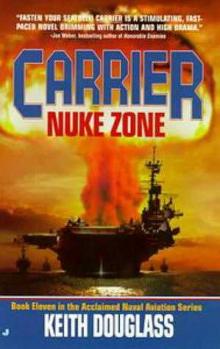 Nuke Zone c-11
Nuke Zone c-11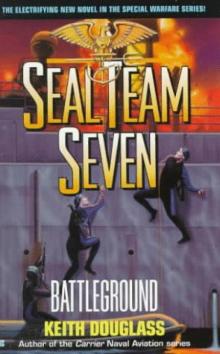 Seal Team Seven 6 - Battleground
Seal Team Seven 6 - Battleground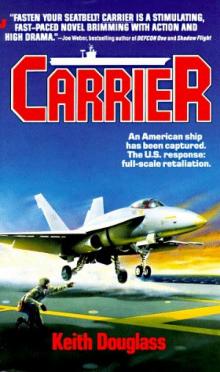 Carrier c-1
Carrier c-1 Island Warriors c-18
Island Warriors c-18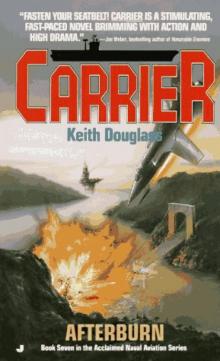 Afterburn c-7
Afterburn c-7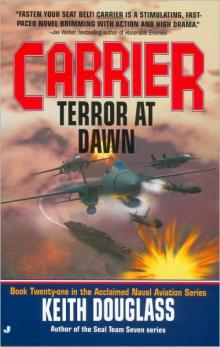 Terror At Dawn c-21
Terror At Dawn c-21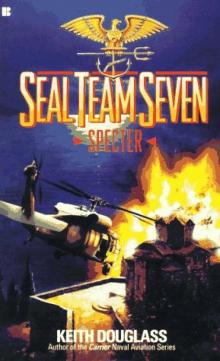 Specter sts-2
Specter sts-2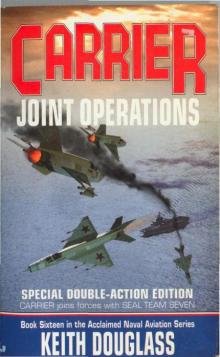 Joint Operations c-16
Joint Operations c-16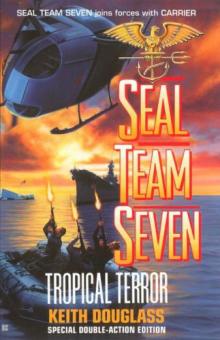 Tropical Terror sts-12
Tropical Terror sts-12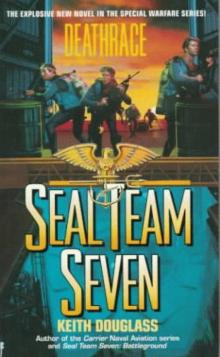 Seal Team Seven 7 - Deathrace
Seal Team Seven 7 - Deathrace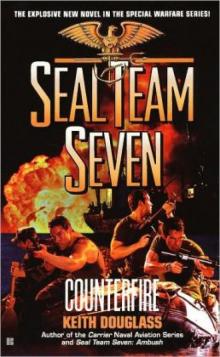 Counterfire sts-16
Counterfire sts-16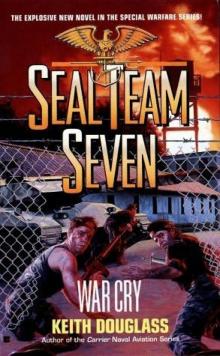 War Cry sts-9
War Cry sts-9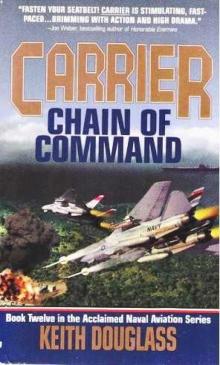 Chain of Command c-12
Chain of Command c-12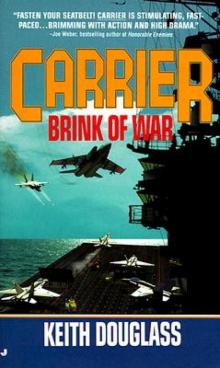 Brink of War c-13
Brink of War c-13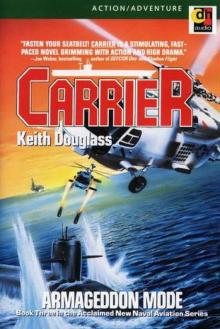 Armageddon Mode c-3
Armageddon Mode c-3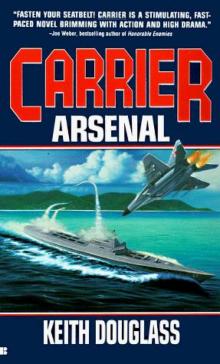 Arsenal c-10
Arsenal c-10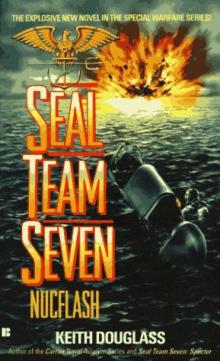 Nucflash sts-3
Nucflash sts-3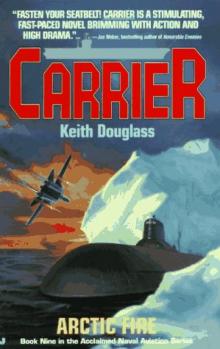 Arctic Fire c-9
Arctic Fire c-9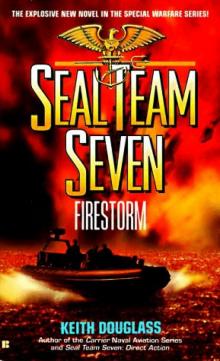 Firestorm sts-5
Firestorm sts-5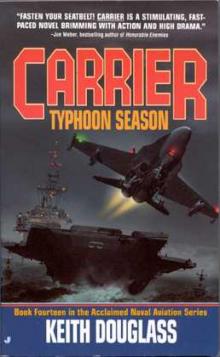 Typhoon Season c-14
Typhoon Season c-14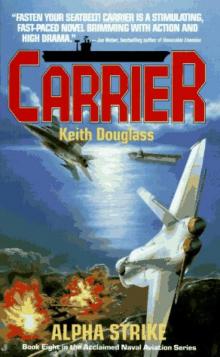 Alpha Strike c-8
Alpha Strike c-8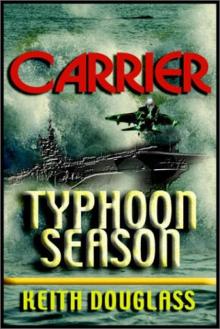 Carrier 14 - TYPHOON SEASON
Carrier 14 - TYPHOON SEASON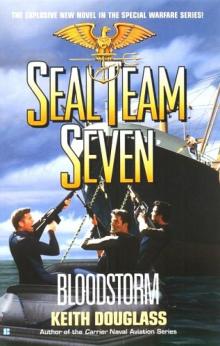 Bloodstorm sts-13
Bloodstorm sts-13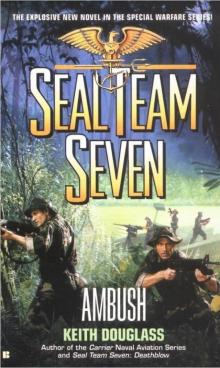 Ambush sts-15
Ambush sts-15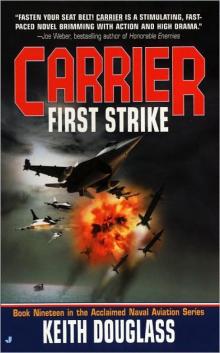 First Strike c-19
First Strike c-19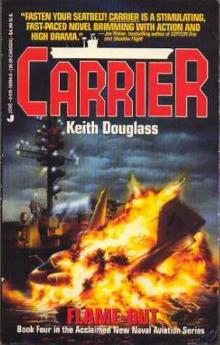 Flame Out c-4
Flame Out c-4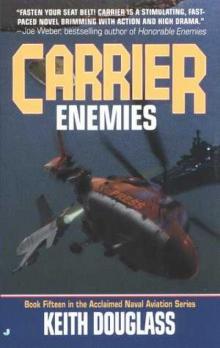 Enemies c-15
Enemies c-15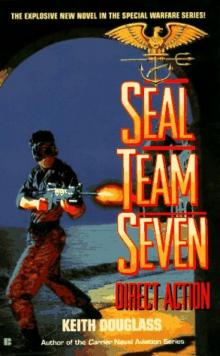 Seal Team Seven 04 - Direct Action
Seal Team Seven 04 - Direct Action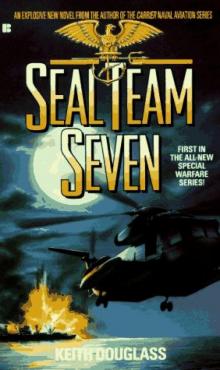 Seal Team Seven 01 - Seal Team Seven
Seal Team Seven 01 - Seal Team Seven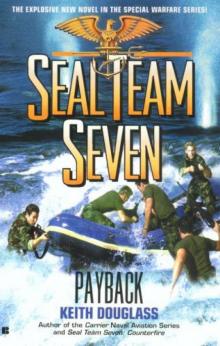 Payback sts-17
Payback sts-17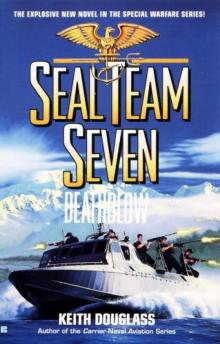 Death Blow sts-14
Death Blow sts-14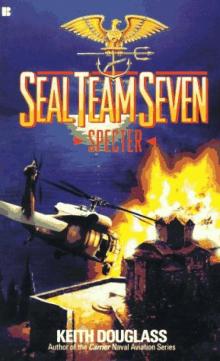 Seal Team Seven 02 - Spector
Seal Team Seven 02 - Spector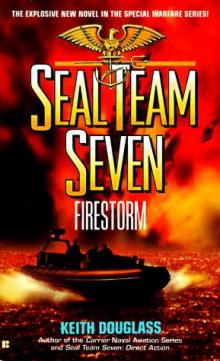 Seal Team Seven 5 - Firestorm
Seal Team Seven 5 - Firestorm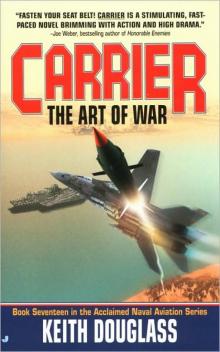 The Art of War c-17
The Art of War c-17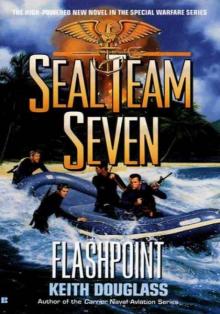 Flashpoint sts-11
Flashpoint sts-11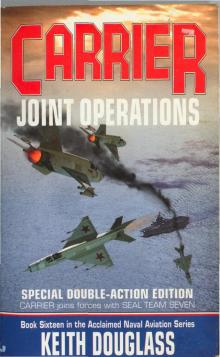 Carrier - Joint Operation Book 16
Carrier - Joint Operation Book 16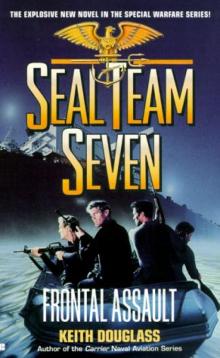 Frontal Assault sts-10
Frontal Assault sts-10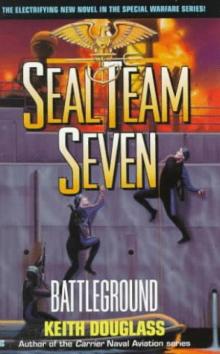 Battleground sts-6
Battleground sts-6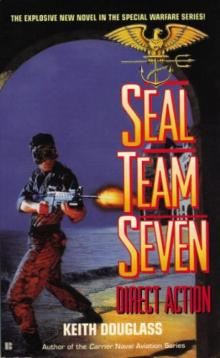 Direct Action sts-4
Direct Action sts-4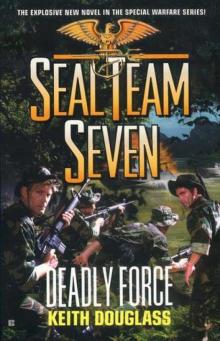 Deadly Force sts-18
Deadly Force sts-18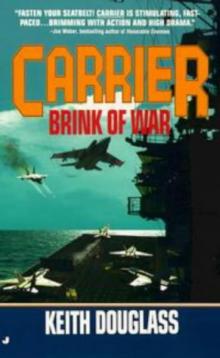 Carrier 13 - Brink of War
Carrier 13 - Brink of War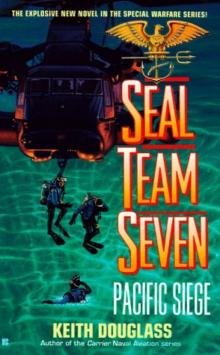 Pacific Siege sts-8
Pacific Siege sts-8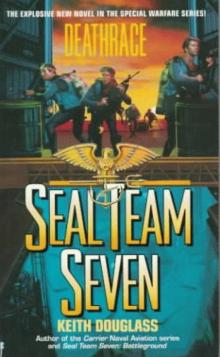 Deathrace sts-7
Deathrace sts-7